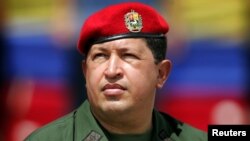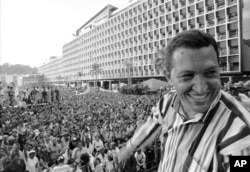Students rise to their feet as a uniformed Venezuelan brigadier-general enters a large classroom at a Caracas military institute and proclaims: "Chavez lives!”
In unison, they reply: "The fight goes on!" before settling at their desks for a lecture punctuated with references to Venezuela's late socialist leader Hugo Chavez, who died of cancer last year.
A new academic course in Venezuela, "Studies of the Thoughts of the Supreme Commander Hugo Chavez," has been set up by the military and already attracted more than 10,000 students.
Critics deride it as a North Korean-style personality deification, while proponents say the course promotes humanist values and ideals espoused by Chavez that both Venezuela and a materialistic wider world badly need.
"Chavez, for us, is the bringing of Bolivarian thought into the 21st century," the brigadier-general, Moises Villarroel, tells his class of about 50 students in reference to revered South American 19th century independence hero Simon Bolivar.
Military personnel from Argentina, Brazil, Ecuador and Nicaragua are dotted among the mainly Venezuelan soldiers who make up his audience at a defense studies center.
Tracing Chavez’s development
The course, which can form part of a degree or post-graduate studies, traces Chavez's philosophical roots from Bolivar to other Venezuelan thinkers and anti-colonial heroes like Simon Rodriguez, Ezequiel Zamora, Francisco Miranda and Antonio Sucre.
It analyzes Chavez's boyhood in a rural shack, his love of baseball, his years in the military and failed coup attempt, the election victory that brought him to power, and the 1999-2013 presidency that made him a hero for many of Venezuela's poor but an anti-democratic strongman to foes.
One enthusiastic student, Victor Flores, a military colonel, said he especially enjoyed learning personal anecdotes he had not heard before – about Chavez's grandmother Rosa Ines and another distant relative and revolutionary known as Maisanta.
"You can see the commander's simpler, human side," he said.
Students so far come mainly from military ranks and government agencies, doing the course as a complement to their main studies, but the base is widening.
Proponents dismiss suggestions that it is too early to subject to academic scrutiny a man who only died last year.
"Not at all," added Flores, in a corridor outside a lecture room. "We studied him in life, from his speeches and his Sunday 'Hello President' programs. So this is just a continuation."
‘Pastor of his people’
Chavez put Venezuela on the world map for more than just oil and beauty queens. His image abroad forms one of the last course segments: "Chavez, the continental and global leader."
Students pore over his speeches to a plethora of summits including, most famously, his 2006 appearance at the United Nations, where he complained of the “smell of sulfur” at a podium where the “devil” George W. Bush had stood the day before.
"At all times, he sought to imitate Christ in his actions. ... He became the pastor of his people," said another brigadier-general, Nerio Galban, secretary of the Bolivarian Military University of Venezuela where the course originated.
Biblical comparison
In an office decorated with images of Bolivar and Chavez, Galban likened the Biblical story of Jesus feeding the 5,000 to Chavez's subsidized food programs. He compared Jesus' healing of the sick to the “Miracle Mission” set up in 2004 to give free cataract surgery and other eye treatments.
"He lives through us," added Galban.
Such quasi-religious sentiment is all too much for a large section of society that opposed Chavez and now his successor, President Nicolas Maduro. They say Chavez's authoritarian rule and socialist economics ruined Venezuela.
Pro-opposition students scoff at the “Hugo Chavez Studies” course as yet more brainwashing by the government and security forces, with no academic value or professional prestige.
Maduro promotes predecessor
For sure, with his scrawled signature and visage ubiquitous on buildings and T-shirts all over Venezuela, Chavez already has a cult status among supporters after death. That’s actively encouraged by the government of Maduro, who calls himself Chavez's "son," to bolster its own popularity.
Visiting dignitaries are taken to the hilltop mausoleum where Chavez's remains lie, a new font has immortalized his handwriting, his Tweets have been turned into a book, and there is even a ballet celebrating Chavez's life.
State TV still features him once every six minutes, a critical study showed.
Those behind the academic course insist, however, that criticism is encouraged in the classroom – with the same spirit of “rectification” that Chavez preached.
Developed last year but expanding this, the course is offered at various state universities, and goes onto the street via free symposiums and events.
Proponents also hope to offer it in private universities - though that could be a hard sell.
"How ridiculous!" said Lukas Moreno, 20, studying engineering at Caracas' Catholic University. "They should go ahead and offer it here. Not a single person would sign up."






